CBSE Class 10 English Supplementary Reader – Chapter 4 – Download PDF Notes
A Question of Trust (Prose)
A Question of Trust is the fourth chapter of class 10th English supplementary textbook Footprints without Feet. It is a story of a man who is fond of collecting rare and expensive books. To buy these books, the 50-year-old man commits a robbery once a year. This time also he has made a plan to rob a garage. Will he be able to achieve his disgraceful goal? Read the story to know what happened next. Also, GharPeShiksha is providing students with PDF notes of this chapter. You can download it from the website of GharPeShiksha. The study material contains word meanings, a summary of the chapters, solved previous year question papers, NCERT textbooks solutions consistent with the CBSE marking scheme, sample questions for practice, expected questions that may appear in the exam.
Here downloads the PDF Notes File of this chapter.
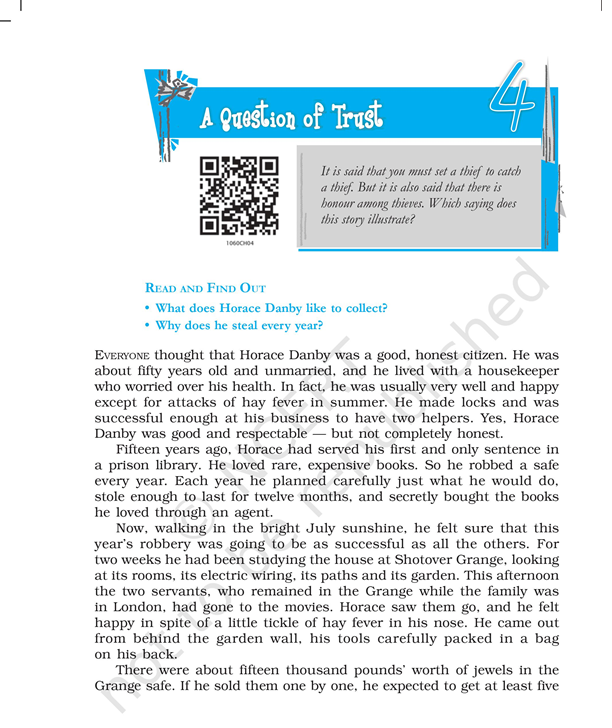
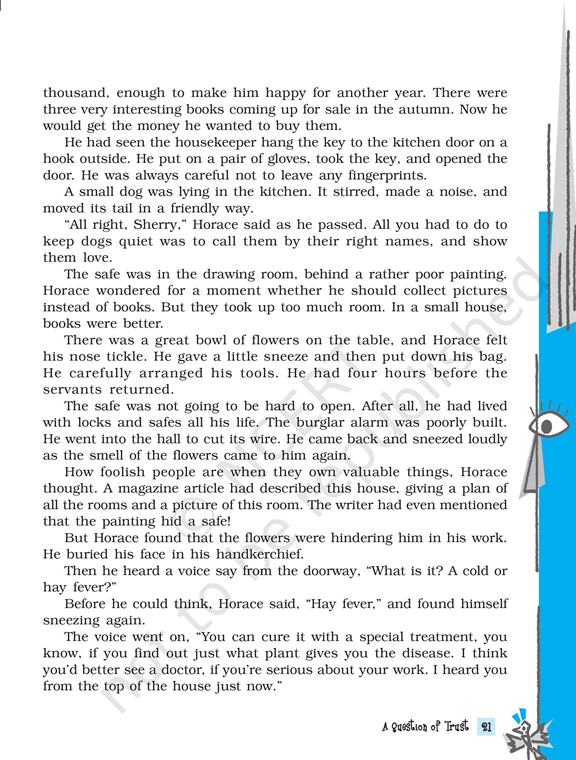
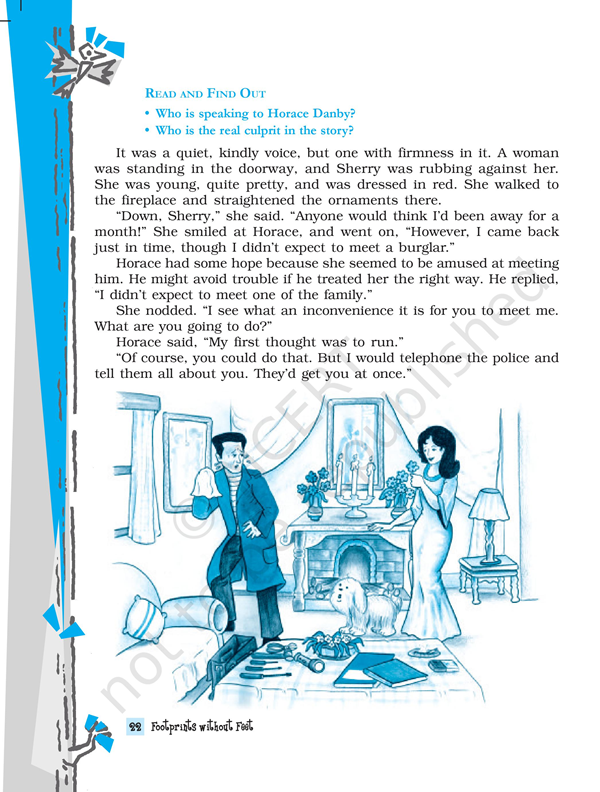
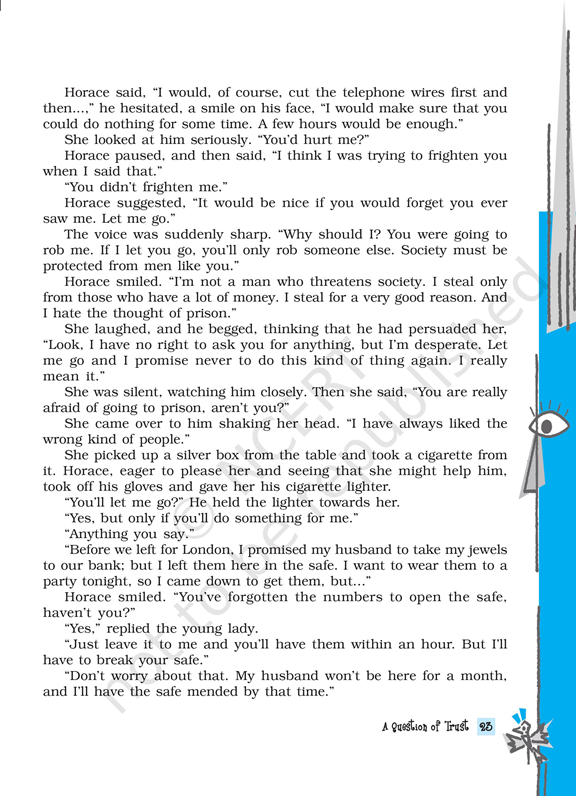
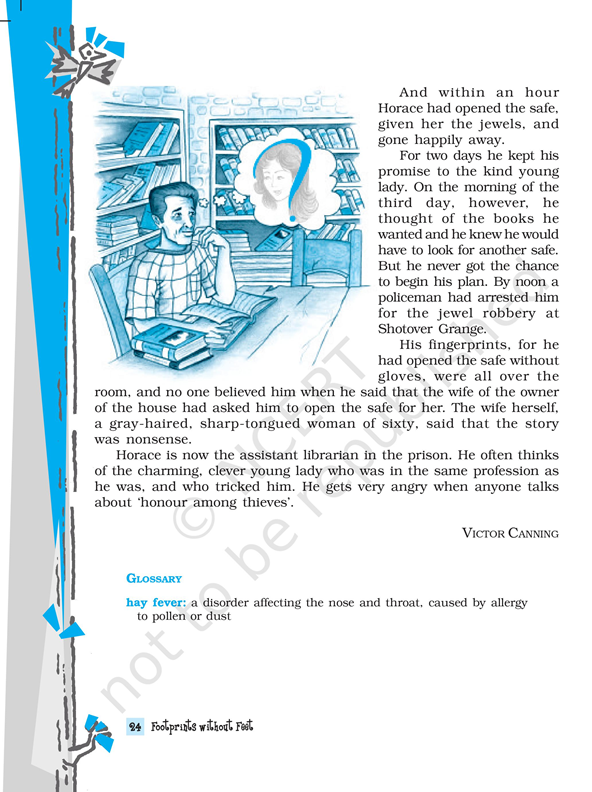
A Question of Trust By Victor Canning
Everyone thought that Horace Danby was a good, honest citizen. He was about fifty years old and unmarried, and he lived with a housekeeper who worried over his health. In fact, he was usually very well and happy except for attacks of hay fever in summer. He made locks and was successful enough at his business to have two helpers. Yes, Horace Danby was good and respectable — but not completely honest.
Fifteen years ago, Horace had served his first and only sentence in a prison library. He loved rare, expensive books. So he robbed a safe every year. Each year he planned carefully just what he would do, stole enough to last for twelve months, and secretly bought the books he loved through an agent.
Now, walking in the bright July sunshine, he felt sure that this year’s robbery was going to be as successful as all the others. For two weeks he had been studying the house at Shotover Grange, looking at its rooms, its electric wiring, its paths and its garden. This afternoon the two servants, who remained in the Grange while the family was in London, had gone to the movies. Horace saw them go, and he felt happy in spite of a little tickle of hay fever in his nose. He came out from behind the garden wall, his tools carefully packed in a bag on his back.
There were about fifteen thousand pounds’ worth of jewels in the Grange safe. If he sold them one by one, he expected to get at least five thousand, enough to make him happy for another year. There were three very interesting books coming up for sale in the autumn. Now he would get the money he wanted to buy them.
He had seen the housekeeper hang the key to the kitchen door on a hook outside. He put on a pair of gloves, took the key, and opened the door. He was always careful not to leave any fingerprints. A small dog was lying in the kitchen. It stirred, made a noise, and moved its tail in a friendly way.
“All right, Sherry,” Horace said as he passed. All you had to do to keep dogs quiet was to call them by their right names, and show them love.
The safe was in the drawing room, behind a rather poor painting. Horace wondered for a moment whether he should collect pictures instead of books. But they took up too much room. In a small house, books were better.
There was a great bowl of flowers on the table, and Horace felt his nose tickle. He gave a little sneeze and then put down his bag. He carefully arranged his tools. He had four hours before the servants returned.
The safe was not going to be hard to open. After all, he had lived with locks and safes all his life. The burglar alarm was poorly built. He went into the hall to cut its wire. He came back and sneezed loudly as the smell of the flowers came to him again.
How foolish people are when they own valuable things, Horace thought. A magazine article had described this house, giving a plan of all the rooms and a picture of this room. The writer had even mentioned that the painting hid a safe!
But Horace found that the flowers were hindering him in his work. He buried his face in his handkerchief.
Then he heard a voice say from the doorway, “What is it? A cold or hay fever?”
Before he could think, Horace said, “Hay fever,” and found himself sneezing again.
The voice went on, “You can cure it with a special treatment, you know, if you find out just what plant gives you the disease. I think you’d better see a doctor, if you’re serious about your work. I heard you from the top of the house just now.”
It was a quiet, kindly voice, but one with firmness in it. A woman was standing in the doorway, and Sherry was rubbing against her. She was young, quite pretty, and was dressed in red. She walked to the fireplace and straightened the ornaments there.
“Down, Sherry,” she said. “Anyone would think I’d been away for a month!” She smiled at Horace, and went on, “However, I came back just in time, though I didn’t expect to meet a burglar.”
Horace had some hope because she seemed to be amused at meeting him. He might avoid trouble if he treated her the right way. He replied, “I didn’t expect to meet one of the family.”
She nodded. “I see what an inconvenience it is for you to meet me. What are you going to do?”
Horace said, “My first thought was to run.”
“Of course, you could do that. But I would telephone the police and tell them all about you. They’d get you at once.”
Horace said, “I would, of course, cut the telephone wires first and then…,” he hesitated, a smile on his face, “I would make sure that you could do nothing for some time. A few hours would be enough.”
She looked at him seriously. “You’d hurt me?”
Horace paused, and then said, “I think I was trying to frighten you when I said that.”
“You didn’t frighten me.”
Horace suggested, “It would be nice if you would forget you ever saw me. Let me go.”
The voice was suddenly sharp. “Why should I? You were going to rob me. If I let you go, you’ll only rob someone else. Society must be protected from men like you.”
Horace smiled. “I’m not a man who threatens society. I steal only from those who have a lot of money. I steal for a very good reason. And I hate the thought of prison.”
She laughed, and he begged, thinking that he had persuaded her, “Look, I have no right to ask you for anything, but I’m desperate. Let me go and I promise never to do this kind of thing again. I really mean it.”
She was silent, watching him closely. Then she said, “You are really afraid of going to prison, aren’t you?”
She came over to him shaking her head. “I have always liked the wrong kind of people.”
She picked up a silver box from the table and took a cigarette from it. Horace, eager to please her and seeing that she might help him, took off his gloves and gave her his cigarette lighter.
“You’ll let me go?” He held the lighter towards her.
“Yes, but only if you’ll do something for me.”
“Anything you say.”
“Before we left for London, I promised my husband to take my jewels to our bank; but I left them here in the safe. I want to wear them to a party tonight, so I came down to get them, but…”
Horace smiled. “You’ve forgotten the numbers to open the safe, haven’t you?”
“Yes,” replied the young lady.
“Just leave it to me and you’ll have them within an hour. But I’ll have to break your safe.”
“Don’t worry about that. My husband won’t be here for a month, and I’ll have the safe mended by that time.”
And within an hour Horace had opened the safe, given her the jewels, and gone happily away.
For two days he kept his promise to the kind young lady. On the morning of the third day, however, he thought of the books he wanted and he knew he would have to look for another safe. But he never got the chance to begin his plan. By noon a policeman had arrested him for the jewel robbery at Shotover Grange.
His fingerprints, for he had opened the safe without gloves, were all over the room, and no one believed him when he said that the wife of the owner of the house had asked him to open the safe for her. The wife herself, a grey-haired, sharp-tongued woman of sixty, said that the story was nonsense.
Horace is now the assistant librarian in the prison. He often thinks of the charming, clever young lady who was in the same profession as he was, and who tricked him. He gets very angry when anyone talks about ‘honour among thieves’.
A Question of Trust Summary
Horace Danby: A Businessman and an Unusual thief
Horace Danby had a good reputation in society. He was about 50 years old and unmarried. He ran a business of making locks and had two helpers. But Horace was not totally honest. He loved rare and expensive books. Horace robbed a safe every year to finance his expensive hobby. He was now going for committing a robbery.
Horace Plans a Theft
For two weeks horace had studied the country house at Shotover Grange, whose owners normally lived in London. He wanted to burgle (enter illegally for a crime) the jewellery lying in the safe in this house. Horace entered the house when the servants were away. He had an allergy to flowers called hay fever. He started sneezing. Then he heard a lady’s voice. She told him a cure for the sneeze.
Horace Meets a Young and Pretty Lady
Then a young and pretty lady appeared in the doorway. She was young and pretty. His first thought was to run, as the lady told him that she would telephone the police. Horace told her to let him go and forget she ever saw him.
Lady’s Condition for Horace’s freedom
The lady put one condition for letting Horace go. She told him that she had promised her husband to take her jewels to the bank. She had, however, left the jewels in the safe, as she wanted to wear the jewels in a party that night. She came down to get them, but had forgotten the number combination to open the safe. So she needed his help to break open the safe. So Horace opened the safe for her and handed her the jewels to get his freedom.
Horace Got Arrested
After two days a policeman arrested him for the Jewel robbery at Shotover Grange. Horace’s fingerprints were found all over the room. He had opened the safe without using his gloves. He told the police that the lady of the house had told him to open the safe. But the actual lady was a sixty year-old woman. She said that Horace’s story was nonsense. Then Horace realised that the pretty young woman was also a jewel thief who had used his skill to steal the jewels.
Horace is now assistant librarian in prison. He often thinks of the charming and clever young lady. She was in the same profession as him. She had simply tricked him. So he gets angry when anyone talks about “honour among thieves”.
Chapter Sketch
Horace Danby collects rare books and finances his hobby by breaking safes. This year, however, he is caught by a pretty young lady claiming to be the wife of the house owner. She tricks him into opening the safe and handing her the jewels. Horace is later arrested for the Jewel robbery.
About the Characters
Horace Danby: He is a lock opening expert who is caught for a jewellery robbery by trusting a woman who pretended to be a family member of the owner.
The unknown woman: She is a smart thief who uses Horace’s lock opening skills to rob the jewellery from a safe.
Chapter Highlights
- Horace Danby, who ran a business of making locks, had a good reputation in society. But he was not totally honest.
- His hobby was collecting rare an expensive books. Horace robbed one safe every year to finance his costly hobby.
- Horace had been studying the country house at Shotover Grange, whose owner normally lived in London, as he wanted to burgle the jewellery, worth about 15000 pounds, lying in the safe in this house.
- Horace entered the house when the servants where away. But Horace started sneezing because he had an allergy to flowers called hay fever.
- Suddenly he heard a young lady’s voice saying that she could cure him. He then saw her appear in the doorway.
- His first thought was to run, as the lady told him that she would telephone the police. Horace told her to let him go and forget she ever saw him.
- The lady agreed on one condition- he should open the safe for her, as she had to wear the jewels in the safe for a party the same night, but she had forgotten the combination to open the safe.
- So Horace opened the safe for her and handed her the jewels to get his freedom.
- After two days Horace was arrested for the jewel robbery at Shortover Grange. Horace’s fingerprints were found, as he had open the safe without using his gloves.
- When he told the police the lady of the house had asked him to open the safe, he was surprised to learn that the actual lady was a 60-year old woman. Horace then realised that the young woman was also a jewel thief who had used his skill to steal the jewels.
- Horace is now in prison. He understands now that the charming and clever young lady had simply tricked him.
Word Meanings
housekeeper : person looking after the domestic work in a house
hay fever : disease affecting the nose and throat caused by allergy to Pollen or dust
respectable : regarded as good by people
served : spent
sentence : punishment
safe : strong locked box storing valuable items
Grange : big house in a rural area
tickle : itching
make him happy : keep him satisfied
fingerprints : marks left by fingers
wondered : thought
room : space
burglar alarm: alarm to warn about thieves
hindering: delaying
one with firmness in it : determined
ornaments : decorations
inconvenience : trouble
get you : arrest you
hate the thought of : don’t like
desperate : without any hope
wrong kind of people : criminals
mended : repaired
look for : steal from/rob
sharp tongued : using harsh or critical language
charming : friendly and likeable
in the same profession : doing the same work
honour : respect for each other
Questions and Answers
NCERT Solutions
Read and Find Out
1. What does Horace Danby like to collect?
Answer: Horace Danby likes to collect rare and expensive books.
2. Why does he steal every year?
Answer: He stole every year so that he could buy the rare and expensive books that he loved to collect. Each year he planned carefully so as to steal enough to last twelve months.
3. Who is speaking to Horace Danby?
Answer: A lady standing in the door was speaking to Horace Danby. She was young and pretty and was dressed in red. She said she had come just in time, or else her family would have been robbed by Horace. Thus she pretended to be one of the members of the family living at Shortover Grange.
4. Who is the real culprit in the story?
Answer: The real culprit in the story is the woman who pretended to be a member of the family living at Shortover Grange. She tricked Horace Danby into believing her and cleverly took away all the jewels that we are kept in the safe.
Think About It
1. Did you begin to suspect, before the end of the story that the lady was not the person Horace Danby took her to be? If so, at what point did you realise this and how?
Answer: Yes, we begin to suspect before the end of the story that the lady was not the person Horace Danby took her to be. She was unusually calm on seeing Horace. This seemed strange. When she did not call the police and instead asked Horace to take out all the jewels from the safe, even if it meant breaking it open, it seems suspicious. Moreover, it seemed highly unlikely that she would forget the number combinations to open the safe. Therefore it was evident, before the story ended that the lady was not the person Hprace had taken her to be.
2. What was the subtle ways in which the lady manages to deceive Horace Danby into thinking she is the lady of the house? Why doesn’t Horace suspect that something is wrong?
Answer: Her confident walk, her familiarity with the dog Sherry, her act of touching up her makeup and the ease with which she picks a cigarette from the right place are enough to deceive anybody. Horace was too frightened to think properly, so he didn’t expect anything.
3.”Horace Danby was good and respectable but not completely honest”. Why do you think this description is apt for Horace? Why can’t he be categorised as a typical thief?
Answer: Horace’s habits were not typical of a thief. He was fond of books. He used to steal only once in a year so he was never stealing more than his needs. However, an act of theft is still a crime, no matter how well a thief behaves, so this description is apt for Horace. He can’t be categorised as a typical thief because he is not a regular offender like other thieves.
4. Horace Danby was a meticulous planner but still he faltered. Where did he go wrong and why?
Answer: Horace Danby failed to get enough information about the real occupants of the house. He seems to be to occupied with collecting information about the house map, wiring and location of valuable items. Although he was smart enough to know the dog’s actual name, he overlooked getting information about the occupants of the house. When he landed in trouble with the appearance of the young lady, his clever mind gave way to carelessness leading him to open the save without wearing gloves.
Talk About It
1. Do you think Horace Danby was unfairly punished, or that he deserved what he got?
Answer: Horace Danby deserved what he got. A crime is a crime, no matter if it is committed for your own benefit or somebody else’s benefit.
2. Do intentions justify actions? Would you, like Horace Danby, do something wrong if you thought your ends justified the means? Do you think that there are situations in which it is excusable to act less than honesty?
Answer: ”Ends do not justify means”, is a very old and time-tested saying. For their own benefit nobody should harm others. But this world doesn’t function on idealism. There are many examples of people tricking people for quick gains. These acts should be deplored and dealt with severely.
Extra Questions
Extract Based Questions
Read the following extract carefully and choose the correct option.
1. So he robbed a safe every year. Each year he planned carefully just what he would do, stole enough to last for 12 months, and secretly bought the books he loved through an agent.
(i) Who is ‘he’ in the above extract?
(a) Horace’s accompliance
(b) Horace’s friend
(c) Horace’s father
(d) Horace
(ii) Why did ‘he’ rob only one safe every year?
(a) Because the money that he stole lasted 12 months and was enough to satisfy his hobby.
(b) Because he was capable of robbing only one safe in a year
(c) Because he was lazy
(d) Because he did not get a chance to rob more than one safe
(iii) Find the word from the extract that means the opposite of ‘openly’.
(a) Closely
(b) Carefully
(c) Secretly
(d) Covertly
(iv) The word ‘through’ in the extract is a
(a) Noun
(b) Preposition
(c) Pronoun
(d) Verb
Answers: (i) (d) Horace
(ii) (a) Because the money that he stole lasted 12 months and was enough to satisfy his hobby.
(iii) (c) Secretly
(iv) (b) Preposition
2. A small dog was lying in the kitchen. It stirred, made a noise, and moved its tail in a friendly way.
(i) What is the name of the dog mentioned in the above extract?
(a) Sunny
(b) Berry
(c) Bunny
(d) Sherry
(ii) In which house is the kitchen referred to located?
(a) Shotover Grange
(b) Shootover Grange
(c) Shotoover Grange
(d) Blotover Grange
(iii) …………in the passage means the same as ‘cordial’.
(a) Unfriendly
(b) Stirred
(c) Warm
(d) Friendly
(iv) What is the meaning of ‘stirred’?
(a) To move or cause something to move slightly
(b) To stay calm
(c) To stay fixed
(d) To move rapidly
Answers: (i) (d) Sherry
(ii) (a) Shotover Grange
(iii) (d) Friendly
(iv) (a) To move or cause something to move slightly
3. The voice went on, “You can cure it with a special treatment, you know, if you find out just what plant gives you the disease. I think you’d better see a doctor, if you’re serious about your work.”
(i) Whose voice is referred to in the above extract?
(a) the old lady who pretended to be a member of the household
(b) the young lady who pretended to be a servant of the household
(c) the young lady who pretended to be a member of the household
(d) the young man who pretended to be a member of the household
(ii) What disease was the voice referring to?
(a) Fever
(b) Yellow fever
(c) Typhoid
(d) Hay fever
(iii) Find a word from the passage that means the same as ‘ailment’.
(a) Disease
(b) Malaise
(c) Unease
(d) Treatment
(iv) What part of speech is the word ‘it’ in the extract?
(a) Pronoun
(b) Noun
(c) Verb
(d) Preposition
Answers: (i) (c) the young lady who pretended to be a member of the household
(ii) (d) Hay fever
(iii) (a) Disease
(iv) (a) Pronoun
4. She laughed, and he begged, thinking that he had persuaded her, “Look, I have no right to ask you for anything, but I’m desperate.”
(i) Who are ‘she’ and ‘he’ in the above extract?
(a) ‘She’ is Horace’s mother and ‘he’ is Horace.
(b) ‘She’ is the old lady who Horace met in the house and ‘he’ is Horace.
(c) ‘She’ is the young lady who Horace met in the house and ‘he’ is Horace’s friend.
(d) ‘She’ is the young lady who Horace met in the house and ‘he’ is Horace.
(ii) Why did ‘he’ say that he is desperate?
(a) Because he wanted the money badly
(b) Because he wanted to complete another robbery on the same day.
(c) Because he did not want to go to prison again
(d) Because he had an attack of hay fever
(iii) Find a word in the passage that means the same as ‘convinced’?
(a) Dissuaded
(b) Begged
(c) Persuaded
(d) Coerced
(iv) …… is the opposite of ‘desperate’
(a) Composed
(b) Coaxed
(c) Swindled
(d) Hopeless
Answers: (i) (d) ‘She’ is the young lady who Horace met in the house and ‘he’ is Horace.
(ii) (c) Because he did not want to go to prison again
(iii) (c) Persuaded
(iv) (a) Composed
Short Questions and Answers
1. Whom did Horace Danby see in the kitchen? How did they greet each other ? What tact did Horace apply there?
Answer: Horace Danby saw the family dog, Sherry, in the kitchen. The dog greeted Horace by stirring, making a noise and wagging its tail in a friendly way. Horace greeted the dog by tactfully calming it down, calling it by its name and showing love to it.
2. How did Danby prepare for the robbery at Shotover Grange?
or
How did Horace Danby plan his robberies?
Answer: Danby always planned his robberies meticulously. He prepared for the robbery at Shotover Grange by studying the house, the electric wiring, paths and garden. He knew that the family normally lived in the city and knew about the movement of the servants, who had gone out that afternoon. He had kept his tools ready, packed in a bag.
3. What was the passion of Horace Danby and how did he satisfy it?
Answer: The passion of Horace Danby was collecting rare and expensive books. To satisfy this passion, he needed money and arranged it by robbing one safe every year and then secretly buying the books through an agent. Though he was an honourable person but not an honest one.
4. Describe the safe at Shotover Grange?
or
Where was the safe at Shotover Grange? What was there inside it? What did Horace expect to get if he sold them one by one?
Answer: The safe at Shotover Grange was kept in the drawing room behind a poor painting and had jewels worth about 15000 pounds kept in it. It had a poorly built burglar alarm, but could be opened only through a specific code.
Horace expected to get 5000 pounds if he sold the jewels one by one.
5. How can you say that Horace Danby was good and respectable but not completely honest?
Answer: Horace Danby was good and respectable because he was an expert in his profession of making locks. However, as he loved collecting rare and expensive books, he robbed a safe every year to finance the purchase of these books through an agent. Thus he was not completely honest.
6. How did flowers hinder Horace in his work?
Answer: Flowers hindered Horace in his work because he had hay fever, a disorder affecting thee nose and throat, caused by allergy to pollen or dust. Due to this problem, whenever he came close to flowers, he began to sneeze and could be caught. He had to cover his face.
7. Why was Horace Danby sure that his robbery at Shotover Grange would be a successful one?
Answer: Horace Danby was sure that his robbery at Shotover Grange would be a successful one because he had studied the house, the drawing room where the safe was kept, the wiring and its garden. He had also studied the movement of the servants, so he had planned well, thus ensuring that nothing could go wrong.
8. What are the subtle ways in which the lady manages to deceive Horace Danby into thinking she is the mistress of the house?
Answer: The subtle ways in which the lady manages to deceive Horace Danby into thinking she is the mistress of the house are her grace, charm, comfort level , knowledge, persistence, way of talking confidently and familiarity with the household. She even threatens to get him arrested, which convinces Horace Danby that she is genuine.
9. What did Horace Danby wonder about for a moment? What did he think and decide?
Answer: On seeing the poor painting in front of the safe, Horace Danby wondered for a moment whether to collect pictures instead of books. But then, he thought that books were better in a small house like his, as paintings took up too much room.
10. What was Horace Danby’s hobby? How did he manage to fulfil it?
Answer: Horace Danby’s hobby was to buy expensive books that he loved to collect. To fulfil his hobby, he used to break open one safe in a year and rob it so that he could buy the expensive books.
Long Questions and Answers
1. Horace was clever but the lady in red was cleverer. Do you agreed with this statement? Justify your answer.
Answer: Yes, I agree with this statement. Horace was clever, as he planned the robbery carefully, studied the target, took the proper tools and also took his gloves, to ensure leaving no fingerprints. But the young lady in red had all the necessary information, and posing as the mistress of the house, exploited Horace’s fear on being discovered, tricked him into cracking open the safe and handing her the jewels. She even ensured that Horace left his fingerprints at the site, as she distracted him by picking up a cigarette which Horace offered to light after removing his gloves. Thus the lady outwitted (deceived) him.
2. Would you do something wrong (i.e., commit a crime) if you thought that the ends justify the means? Do you think that there are certain situations you can be excused for acting dishonestly?
Answer: Yes, intentions do justify actions. If something wrong is done unintentionally, it may be pardoned. However, it cannot be excused if it is carried out even when knowing it is wrong. As Horace had the intention to rob the safe by breaking it open, his crime is intentional. Although he had good intentions in helping the lady (who he thought was the mistress of the house), his crime cannot be excused. Breaking open the safe cannot be justified at all. There may be certain situations when you can be excused for acting dishonesty, but this is not so in Horace’s case. Horace had robed one safe every year to buy books, yet he was a good and respectable person in public view, but it is not completely honest. So, in the same manner, if we do the same, it may look good in others’ eyes but cannot be pardoned at all, as a crime is always a crime. And guilty has to be punished.
3. Horace was a successful thief because he carefully planned his robberies. Should we call him a successful thief and still appreciate his work? Why or why not?
Answer: Yes, as a thief, Horace is successful because he carefully planned his robberies and completes them well. Before robbing at Shotover Grange, he had studied the house for two weeks, looked at the electric writing, its path and its garden. He wore a pair of gloves so that no fingerprint was left. He had studied everything minutely except the people living in the house. Besides, he had a faith in the saying “Honour among the thieves.” He was living his life as a good and honest citizen. However, the wealth he gathered due from his successful robberies did not belong to him. By stealing other people’s valuables, he may have become successful but he is actually a criminal. He may be efficient in conducting his crimes so that he is successful, but we still cannot appreciate his work.



